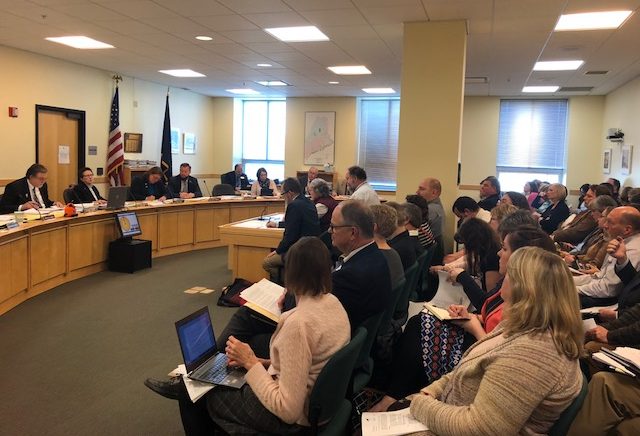AUGUSTA — A bill that would shift special education services for preschool-age children from the state to Maine’s school districts isn’t a bad idea, but there are many questions about how it would work and how to pay for it, dozens of people told lawmakers Monday.
“Slow this process down,” said Carrie Woodcock, whose daughter has Down syndrome. “This is an opportunity to make this a great time of change, but let’s do this the right way and not the rushed way.”
Woodcock, the director of the Maine Parent Federation, a nonprofit that helps parents with special needs children, was one of dozens of people who testified at the hours-long public hearing before the Legislature’s Education and Cultural Affairs Committee.
The bill, L.D. 1870, would shift all special education services for 3- to 5-year-olds from the Maine Department of Education to local school districts.
In Maine, the department regularly runs over its $30 million annual budget for those services provided to 2,068 children aged 3 to 5 statewide by the department’s Child Development Services. But CDS has had multimillion-dollar deficits for years, driven by flat state funding and the rising cost of special education services.
On Monday, most of the speakers urged delay, citing concerns about funding and whether there was enough time to make the shift by June 2020. Others asked how the schools would be able to do better than CDS, which regularly has waiting lists for services, budget overruns and other issues.
Lawmakers on the committee did not act, and several asked department officials to provide more details before they take up the bill in a work session scheduled for Wednesday. Multiple speakers said they thought the bill, introduced four weeks before the end of the session, was being rushed through.
“It’s a leap of faith, asking the districts to do that,” said Rep. David McCrea, D-Fort Fairfield, citing in particular how the districts would be reimbursed. A department official said they intended to fully reimburse the districts, but did not spell out how.
“I have faith in your intent,” McCrea said. “I don’t have as much faith in the funding scheme. It’s a transition and something this large, at best, it’s going to be difficult.
“This shouldn’t be a crapshoot for the districts to assume this massive responsibility.”
Education Commissioner Bob Hasson said the system isn’t working because a shortage of providers means too many children are not getting the services they need.
“The time is right for this change,” said Janice Breton, the state director of special services. “This bill is intended to correct many problems in the system.”
Special education covers a complex network of services tailored to each individual student’s needs. Under the proposal, schools would not only provide the special education services, but they also would be responsible for identifying the children who need services, case management, evaluation, determining eligibility and developing individual education plans.
Shifting to a school-based model can increase access to services and cut costs because schools already have specialists and a transportation system, officials said.
But some school districts report already having trouble finding specialists for their special education students, and it was unclear whether shifting the program from Child Development Services to the schools would ease the shortage of providers.
Several superintendents who are working with the department on a grant-funded pilot project said they thought they could be successful taking on the new duties, but they too acknowledged that the districts would have to work with the department and service providers to flesh out how it would work – and that it would be very different in urban areas with nearby service providers and in rural areas where a specialist may be located hours away.
Lewiston Superintendent Bill Webster said other states have been successful with the model.
“This legislation needs some work, but until Maine passes legislation, the transition of service to the local school districts will remain nothing but talk, and we will perpetuate a system that falls short of what Maine’s children need.”
The DOE would continue to provide services directly for children 2 and under.
In general, superintendents have said they see the logic of the idea and recognize that many states already operate under systems similar to what the bill is proposing for Maine.
Superintendent Jeremy Ray of Biddeford said Monday that he supported the proposal, if the state promises to fully reimburse the districts for the costs of the program – and that funding must be separate from the traditional “essential programs and services” funding formula.
“This is critically important,” he said, noting that there are three other districts that plan to partner with Biddeford on a regional effort to provide the special education services.
The bill doesn’t spell out the Department of Education’s reimbursement plan, and district officials have raised practical questions about how to pay for it, whether districts have space in their buildings for more children, the ability to find specialists needed, or even have the appropriate buses and drivers to transport the children to school.
Noel K. Gallagher can be contacted at 791-6387 or at:
Twitter: noelinmaine
Send questions/comments to the editors.



